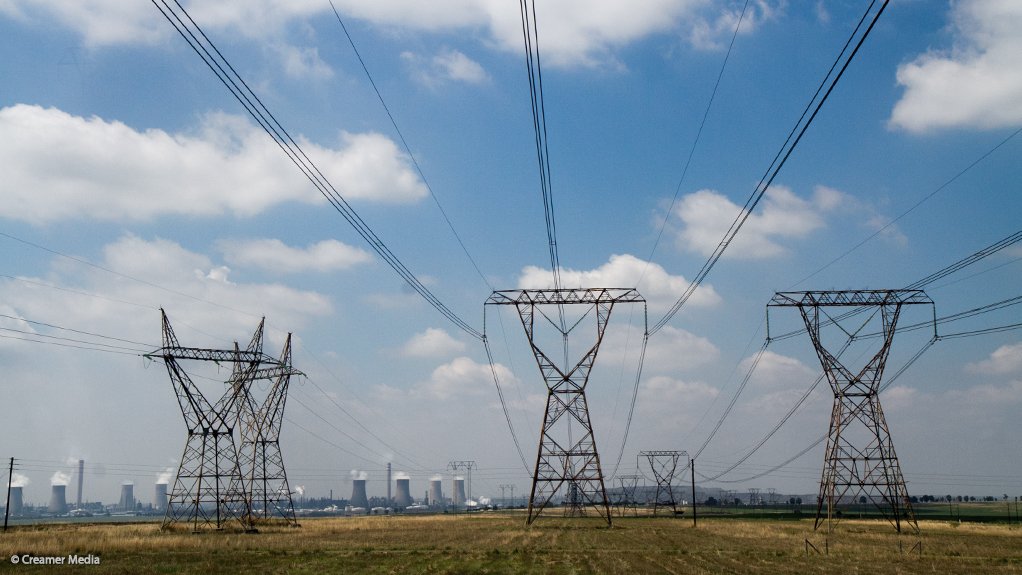South Africa’s synfuels know-how could give it edge as world mulls power fuels


Transmission lines with Sasol's Secunda complex in the background, where synthetic fuels and chemicals are produced from coal
Photo by Creamer Media
The newly formed Global Alliance Power Fuels believes that South Africa is well positioned to become a leading site for the large-scale production of liquid fuels from renewable energy and has confirmed with Engineering News Online that the country is on its radar for possible future demonstration projects.
The alliance was launched in Berlin, Germany, in September following several studies indicating that synthetic fuels produced using renewable electricity could be the “missing link” in reducing greenhouse-gas emissions in sectors where it is difficult to employ clean electricity directly.
Conducted by the German Energy Agency, known by its German acronym dena, the studies conclude that the main applications for power fuels would be in transport, heating and storage in the electricity sector, as well as in a host of industrial applications.
Power fuels are produced in electrolysers, which are able to split water into hydrogen and oxygen. When powered by renewable electricity the fuels produced are considered to be carbon neutral.
The hydrogen emerging from an electrolyser can then be used directly in various industrial and transport applications, including fuel cells. Alternatively, the hydrogen can be processed further, using the Fischer-Tropsch (FT) process, to produce synthetic fuels such as methane, gasoline, diesel or kerosene.
The alliance believes South Africa’s extensive FT knowledge and experience – developed by Sasol and PetroSA for the production of liquid fuels and chemicals from coal and gas, could, in future, be harnessed to produce clean power fuels.
In fact, dena deputy head of the renewable energies and mobility Stefan Siegemund describes South Africa’s extensive experience in deploying and operating large-scale FT plants as a “ big advantage”.
“South Africa’s current plants and expertise in FT processes could be used for the production of power fuels, but instead of using local coal, they would use local renewable power and electrolysis.”
Developing a market for power fuels is expected to take a number of years and the Global Alliance Power Fuels stresses that it will required both political will and the cooperation of companies along the entire supply chain.
“Our aim is to combine the forces of industry and research internationally to accelerate the market development for power fuels,” Siegemund reports.
The alliance´s initial utility, technology, transport and energy participants are mostly from Europe and include Audi, Daimler, the German Liquid Gas Association, Enertrag, the German Aerospace Centre, the Institute of Heating and Oil Technology, Robert Bosch, Shell, Uniper Kraftwerke and the Federal Association of Small and Medium-Sized Oil Companies.
The technology components required for the production of power fuels already exist and are proven. The challenge for the alliance lies in scaling up production and reducing costs by 2030.
The cost of renewable electricity, as well as the capacity factor of those plants, is a key cost driver. For this reason, countries with superior wind and solar resources, such as South Africa, could have an advantage over other jurisdictions. However, cost and conversion efficiency of electrolysis and the future level of carbon pricing will also be key to determining the competitiveness of power fuels.
Demand for power fuels could well be stimulated in the short term by their recent inclusion in the European Union’s updated Renewable Energy Directive, or REDII. The directive states that, by 2030, at least 14% of transportation fuel must come from renewable sources, such as biofuels and power fuels.
However, Siegemund says further incentives will be needed to facilitate the construction of the first generation of large-scale power fuel plants.
“The cost of carbon-neutral power fuels is today between two and four times higher than comparable biofuels. But studies have shown that target costs of around €1/l diesel equivalent may be possible from regions with good solar and wind power conditions. So, cost parity with biofuels may be within reach.”
In the longer term, power fuels offer advantages over biofuels, not least because they will not compete with food production or require arable land. Therefore, power fuels can be produced in far larger volumes.
In addition, power fuels could play an important role in the stability of a fully renewable energy system, as less electricity would be curtailed during peak production periods, while the fuels produced could bolster long-term energy storage, which can be drawn upon when the wind is not blowing and the sun is not shining.
However, the alliance emphasises the importance of a supportive political framework, including a realistic carbon price, for unlocking the potential of power fuels.
Impetus may be provided should countries agree to the steps outlined in the United Nations Intergovernmental Panel on Climate Change’s recently released special report, titled ‘Global Warming of 1.5°C’.
The document argues that there would be material environmental, health and social benefits to limiting global warming to 1.5°C above preindustrial levels, rather than allowing temperatures to increase by 2°C. It is also set to provide scientific input into the upcoming Katowice Climate Change Conference, scheduled for Poland in December, where the 2016 Paris Agreement will be reviewed.
The special report calls for “rapid and far-reaching” transitions in land, energy, industry, buildings, transport and cities to achieve this more ambitious outcome. “Global net human-caused emissions of carbon dioxide would need to fall by about 45% from 2010 levels by 2030, reaching ‘net zero’ by around 2050.”
The Global Alliance Power Fuels will seek to use its influence to argue that power fuels are both a necessity and business opportunity for a sustainable energy system. “It has become clear that very low or zero-emission fuels are essential for achieving the energy transition and a low-carbon economy,” Siegemund concludes.
Comments
Press Office
Announcements
What's On
Subscribe to improve your user experience...
Option 1 (equivalent of R125 a month):
Receive a weekly copy of Creamer Media's Engineering News & Mining Weekly magazine
(print copy for those in South Africa and e-magazine for those outside of South Africa)
Receive daily email newsletters
Access to full search results
Access archive of magazine back copies
Access to Projects in Progress
Access to ONE Research Report of your choice in PDF format
Option 2 (equivalent of R375 a month):
All benefits from Option 1
PLUS
Access to Creamer Media's Research Channel Africa for ALL Research Reports, in PDF format, on various industrial and mining sectors
including Electricity; Water; Energy Transition; Hydrogen; Roads, Rail and Ports; Coal; Gold; Platinum; Battery Metals; etc.
Already a subscriber?
Forgotten your password?
Receive weekly copy of Creamer Media's Engineering News & Mining Weekly magazine (print copy for those in South Africa and e-magazine for those outside of South Africa)
➕
Recieve daily email newsletters
➕
Access to full search results
➕
Access archive of magazine back copies
➕
Access to Projects in Progress
➕
Access to ONE Research Report of your choice in PDF format
RESEARCH CHANNEL AFRICA
R4500 (equivalent of R375 a month)
SUBSCRIBEAll benefits from Option 1
➕
Access to Creamer Media's Research Channel Africa for ALL Research Reports on various industrial and mining sectors, in PDF format, including on:
Electricity
➕
Water
➕
Energy Transition
➕
Hydrogen
➕
Roads, Rail and Ports
➕
Coal
➕
Gold
➕
Platinum
➕
Battery Metals
➕
etc.
Receive all benefits from Option 1 or Option 2 delivered to numerous people at your company
➕
Multiple User names and Passwords for simultaneous log-ins
➕
Intranet integration access to all in your organisation


















